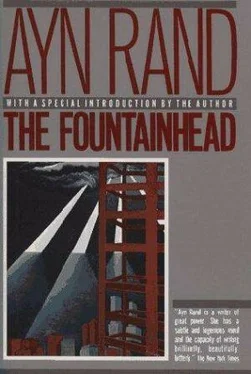"Nothing is given to man on earth. Everything he needs has to be produced. And here man faces his basic alternative: he can survive in only one of two ways — by the independent work of his own mind or as a parasite fed by the minds of others. The creator originates. The parasite borrows. The creator faces nature alone. The parasite faces nature through an intermediary.
"The creator's concern is the conquest of nature. The parasite's concern is the conquest of men.
"The creator lives for his work. He needs no other men. His primary goal is within himself. The parasite lives second-hand. He needs others. Others become his prime motive.
"The basic need of the creator is independence. The reasoning mind cannot work under any form of compulsion. It cannot be curbed, sacrificed or subordinated to any consideration whatsoever. It demands total independence in function and in motive. To a creator, all relations with men are secondary.
"The basic need of the second-hander is to secure his ties with men in order to be fed. He places relations first. He declares that man exists in order to serve others. He preaches altruism.
"Altruism is the doctrine which demands that man live for others and place others above self.
"No man can live for another. He cannot share his spirit just as he cannot share his body. But the second-hander has used altruism as a weapon of exploitation and reversed the base of mankind's moral principles. Men have been taught every precept that destroys the creator. Men have been taught dependence as a virtue.
"The man who attempts to live for others is a dependent. He is a parasite in motive and makes parasites of those he serves. The relationship produces nothing but mutual corruption. It is impossible in concept. The nearest approach to it in reality — the man who lives to serve others — is the slave. If physical slavery is repulsive, how much more repulsive is the concept of servility of the spirit? The conquered slave has a vestige of honor. He has the merit of having resisted and of considering his condition evil. But the man who enslaves himself voluntarily in the name of love is the basest of creatures. He degrades the dignity of man and he degrades the conception of love. But this is the essence of altruism.
"Men have been taught that the highest virtue is not to achieve, but to give. Yet one cannot give that which has not been created. Creation comes before distribution — or there will be nothing to distribute. The need of the creator comes before the need of any possible beneficiary. Yet we are taught to admire the second-hander who dispenses gifts he has not produced above the man who made the gifts possible. We praise an act of charity. We shrug at an act of achievement.
"Men have been taught that their first concern is to relieve the suffering of others. But suffering is a disease. Should one come upon it, one tries to give relief and assistance. To make that the highest test of virtue is to make suffering the most important part of life. Then man must wish to see others suffer — in order that he may be virtuous. Such is the nature of altruism. The creator is not concerned with disease, but with life. Yet the work of the creators has eliminated one form of disease after another, in man's body and spirit, and brought more relief from suffering than any altruist could ever conceive.
"Men have been taught that it is a virtue to agree with others. But the creator is the man who disagrees. Men have been taught that it is a virtue to swim with the current. But the creator is the man who goes against the current. Men have been taught that it is a virtue to stand together. But the creator is the man who stands alone.
"Men have been taught that the ego is the synonym of evil, and selflessness the ideal of virtue. But the creator is the egotist in the absolute sense, and the selfless man is the one who does not think, feel, judge, or act. These are functions of the self.
"Here the basic reversal is most deadly. The issue has been perverted and man has been left no alternative — and no freedom. As poles of good and evil, he was offered two conceptions: egotism and altruism. Egotism was held to mean the sacrifice of others to self. Altruism — the sacrifice of self to others. This tied man irrevocably to other men and left him nothing but a choice of pain: his own pain borne for the sake of others or pain inflicted upon others for the sake of self. When it was added that man must find joy in self-immolation, the trap was closed. Man was forced to accept masochism as his ideal — under the threat that sadism was his only alternative. This was the greatest fraud ever perpetrated on mankind.
"This was the device by which dependence and suffering were perpetuated as fundamentals of life.
"The choice is not self-sacrifice or domination. The choice is independence or dependence. The code of the creator or the code of the second-hander. This is the basic issue. It rests upon the alternative of life or death. The code of the creator is built on the needs of the reasoning mind which allows man to survive. The code of the second-hander is built on the needs of a mind incapable of survival. All that which proceeds from man's independent ego is good. All that which proceeds from man's dependence upon men is evil.
"The egotist in the absolute sense is not the man who sacrifices others. He is the man who stands above the need of using others in any manner. He does not function through them. He is not concerned with them in any primary matter. Not in his aim, not in his motive, not in his thinking, not in his desires, not in the source of his energy. He does not exist for any other man — and he asks no other man to exist for him. This is the only form of brotherhood and mutual respect possible between men.
"Degrees of ability vary, but the basic principle remains the same: the degree of a man's independence, initiative and personal love for his work determines his talent as a worker and his worth as a man. Independence is the only gauge of human virtue and value. What a man is and makes of himself; not what he has or hasn't done for others. There is no substitute for personal dignity. There is no standard of personal dignity except independence.
"In all proper relationships there is no sacrifice of anyone to anyone. An architect needs clients, but he does not subordinate his work to their wishes. They need him, but they do not order a house just to give him a commission. Men exchange their work by free, mutual consent to mutual advantage when their personal interests agree and they both desire the exchange. If they do not desire it, they are not forced to deal with each other. They seek further. This is the only possible form of relationship between equals. Anything else is a relation of slave to master, or victim to executioner.
"No work is ever done collectively, by a majority decision. Every creative job is achieved under the guidance of a single individual thought. An architect requires a great many men to erect his building. But he does not ask them to vote on his design. They work together by free agreement and each is free in his proper function. An architect uses steel, glass, concrete, produced by others. But the materials remain just so much steel, glass and concrete until he touches them. What he does with them is his individual product and his individual property. This is the only pattern for proper co-operation among men.
"The first right on earth is the right of the ego. Man's first duty is to himself. His moral law is never to place his prime goal within the persons of others. His moral obligation is to do what he wishes, provided his wish does not depend primarily upon other men. This includes the whole sphere of his creative faculty, his thinking, his work. But it does not include the sphere of the gangster, the altruist and the dictator.
Читать дальше










